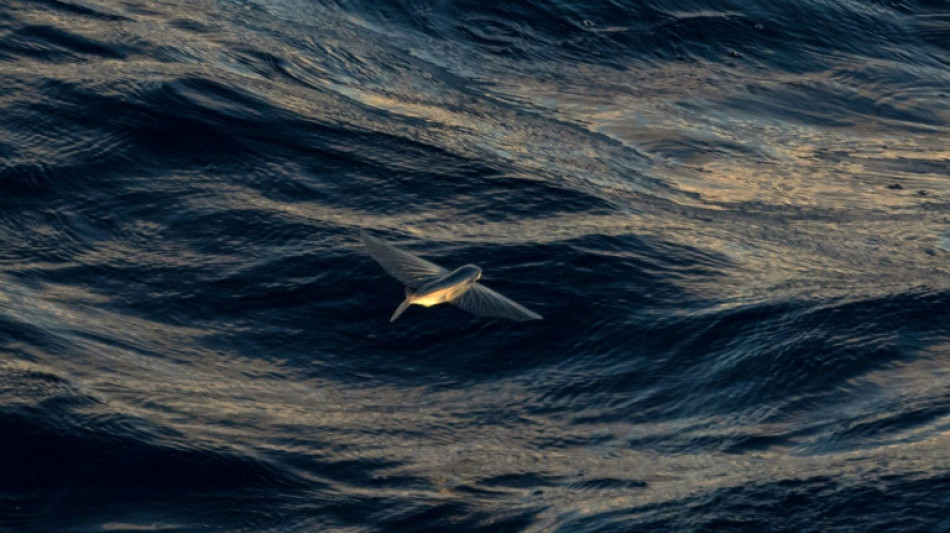
-
 Blanc wins final women's race before Winter Olympics
Blanc wins final women's race before Winter Olympics
-
Elena Rybakina: Kazakhstan's Moscow-born Melbourne champion

-
 Ice-cool Rybakina beats Sabalenka in tense Australian Open final
Ice-cool Rybakina beats Sabalenka in tense Australian Open final
-
Pakistan attacks kill 15, dozens of militants dead: official

-
 Ten security officials, 37 militants killed in SW Pakistan attacks: official
Ten security officials, 37 militants killed in SW Pakistan attacks: official
-
Epstein survivors say abusers 'remain hidden' after latest files release

-
 'Full respect' for Djokovic but Nadal tips Alcaraz for Melbourne title
'Full respect' for Djokovic but Nadal tips Alcaraz for Melbourne title
-
Wollaston goes back-to-back in the Cadel Evans road race

-
 Women in ties return as feminism faces pushback
Women in ties return as feminism faces pushback
-
Ship ahoy! Prague's homeless find safe haven on river boat

-
 Britain's Starmer ends China trip aimed at reset despite Trump warning
Britain's Starmer ends China trip aimed at reset despite Trump warning
-
Carlos Alcaraz: rare tennis talent with shades of Federer

-
 Novak Djokovic: divisive tennis great on brink of history
Novak Djokovic: divisive tennis great on brink of history
-
History beckons for Djokovic and Alcaraz in Australian Open final

-
 Harrison, Skupski win Australian Open men's doubles title
Harrison, Skupski win Australian Open men's doubles title
-
Epstein offered ex-prince Andrew meeting with Russian woman: files

-
 Jokic scores 31 to propel Nuggets over Clippers in injury return
Jokic scores 31 to propel Nuggets over Clippers in injury return
-
Montreal studio rises from dark basement office to 'Stranger Things'

-
 US government shuts down but quick resolution expected
US government shuts down but quick resolution expected
-
Mertens and Zhang win Australian Open women's doubles title

-
 Venezuelan interim president announces mass amnesty push
Venezuelan interim president announces mass amnesty push
-
China factory activity loses steam in January

-
 Melania Trump's atypical, divisive doc opens in theatres
Melania Trump's atypical, divisive doc opens in theatres
-
Bad Bunny set for historic one-two punch at Grammys, Super Bowl

-
 Five things to watch for on Grammys night Sunday
Five things to watch for on Grammys night Sunday
-
Venezuelan interim president proposes mass amnesty law

-
 Rose stretches lead at Torrey Pines as Koepka makes cut
Rose stretches lead at Torrey Pines as Koepka makes cut
-
Online foes Trump, Petro set for White House face-to-face

-
 Seattle Seahawks deny plans for post-Super Bowl sale
Seattle Seahawks deny plans for post-Super Bowl sale
-
US Senate passes deal expected to shorten shutdown

-
 'Misrepresent reality': AI-altered shooting image surfaces in US Senate
'Misrepresent reality': AI-altered shooting image surfaces in US Senate
-
Thousands rally in Minneapolis as immigration anger boils

-
 US judge blocks death penalty for alleged health CEO killer Mangione
US judge blocks death penalty for alleged health CEO killer Mangione
-
Lens win to reclaim top spot in Ligue 1 from PSG

-
 Gold, silver prices tumble as investors soothed by Trump Fed pick
Gold, silver prices tumble as investors soothed by Trump Fed pick
-
Ko, Woad share lead at LPGA season opener

-
 US Senate votes on funding deal - but shutdown still imminent
US Senate votes on funding deal - but shutdown still imminent
-
US charges prominent journalist after Minneapolis protest coverage

-
 Trump expects Iran to seek deal to avoid US strikes
Trump expects Iran to seek deal to avoid US strikes
-
US Justice Dept releases documents, images, videos from Epstein files

-
 Guterres warns UN risks 'imminent financial collapse'
Guterres warns UN risks 'imminent financial collapse'
-
NASA delays Moon mission over frigid weather

-
 First competitors settle into Milan's Olympic village
First competitors settle into Milan's Olympic village
-
Fela Kuti: first African to get Grammys Lifetime Achievement Award

-
 Cubans queue for fuel as Trump issues oil ultimatum
Cubans queue for fuel as Trump issues oil ultimatum
-
'Schitt's Creek' star Catherine O'Hara dead at 71

-
 Curran hat-trick seals 11 run DLS win for England over Sri Lanka
Curran hat-trick seals 11 run DLS win for England over Sri Lanka
-
Cubans queue for fuel as Trump issues energy ultimatum

-
 France rescues over 6,000 UK-bound Channel migrants in 2025
France rescues over 6,000 UK-bound Channel migrants in 2025
-
Surprise appointment Riera named Frankfurt coach


What is the high seas treaty?
The high seas treaty could be law by the end of the year, affording protection to marine life in the vast swathes of ocean that belong to no one.
The treaty was adopted by UN member states in June 2023. It has been ratified by 31 nations plus the European Union, and comes into force 120 days after its 60th ratification.
But at the UN Ocean Conference this week, hosts France said around 50 countries have ratified the pact, bringing it within reach of enactment.
The United States signed the treaty in 2023 under Joe Biden but is not expected to ratify it while Donald Trump is president.
Here are the key points of the treaty text:
- International waters -
The treaty covers international waters, which fall outside the jurisdiction of any single state, and account for more than 60 percent of the world's oceans.
Specifically, it applies to waters beyond countries' exclusive economic zones, which extend up to 200 nautical miles from the coast.
It also covers what is known as "the Area", shorthand for seabed and subsoil beyond the limits of national jurisdiction. The Area comprises just over half of the planet's seabed.
Once enacted, a decision-making body -- a Conference of the Parties (COP) -- would have to work with regional and global organizations that already oversee different aspects of the oceans.
These include regional fisheries bodies and the International Seabed Authority, the arena where nations are hotly contesting a proposed set of rules to govern deep-sea mining.
Trump's decision to sidestep the authority -- to which the US is not a member -- and issue deep-sea mining permits in international waters has raised tricky questions of jurisdiction.
- Marine protected areas -
Currently, almost all protected marine areas (MPAs) are within national territorial waters.
The treaty, however, allows for these reserves to be created in the open ocean.
Most decisions would be taken by a consensus of the COP, but an MPA can be voted into existence with a three-quarters majority, to prevent deadlock caused by a single country.
One crucial shortcoming: the text does not say how these conservation measures will be monitored and enforced over remote swathes of the ocean -- a task that will fall to the COP.
Some experts say satellites could be used to spot infractions.
Individual countries are already responsible for certain activities on the high seas that they have jurisdiction over, such as those of ships flying their flags.
- Sharing the bounty? -
On the high seas, countries and entities under their jurisdiction will be allowed to collect animal, plant, or microbial matter whose genetic material might prove useful, even commercially.
Scientists, for example, have discovered molecules with the potential to treat cancer or other diseases in microbes scooped up in sediment, or produced by sponges or marine mollusks.
Benefits-sharing of those resources has been a key point of contention between wealthy and poorer nations.
The treaty establishes frameworks for the transfer of marine research technologies to developing countries and a strengthening of their research capacities, as well as open access to data.
But it's left to the COP to decide exactly how any monetary benefits will eventually be shared, with options including a system based on specific commercialized products, or more generalized payment systems.
- Environmental impact studies -
The treaty requires signatories to assess the environmental impacts of planned activities under their control on the high seas before they are authorized in instances when such activities may have more than a minor or transitory effect.
It also calls for countries to assess the potential impact on international waters of activities within national jurisdictions that may cause "substantial pollution" or harm the high sea marine environment.
Ultimately, states are responsible for giving the green light to any potentially harmful activity -- a role NGOs hoped would go to the COP, to make controversial approvals more difficult.
The treaty also requires states to publish updates on an activity's environmental impacts. Approvals can be called into question if unanticipated impacts arise.
Though they are not specifically listed in the treaty, activities that could come under regulation include transport and fishing, as well as more controversial subjects such as deep-sea mining or even geo-engineering initiatives to mitigate global warming.
A.Ruiz--AT



